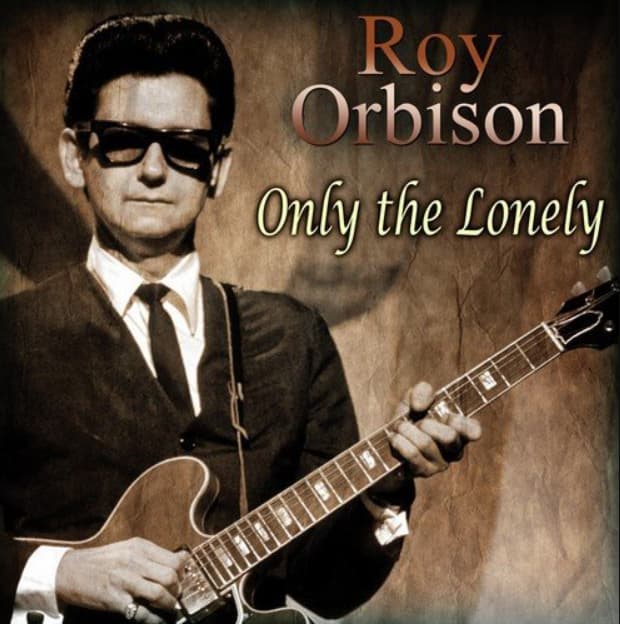
“Only the Lonely” by Roy Orbison: A Timeless Anthem of Heartache
Few voices in popular music carry the emotional weight and raw vulnerability of Roy Orbison. His 1960 hit “Only the Lonely” solidified his place as a master of the pop ballad and a trailblazer in the genre of rock and roll. Released as a single on Monument Records, the song climbed to #2 on the Billboard Hot 100 and topped the UK Singles Chart, becoming one of the defining songs of the early 1960s. “Only the Lonely” is more than just a song about heartbreak; it’s a powerful reflection on isolation, longing, and the pain of unrequited love, all delivered with Orbison’s signature soaring vocals.
Right from the haunting opening notes, “Only the Lonely” sets a mood of melancholy. The song’s arrangement, with its dramatic use of strings, echoing drums, and a waltz-like rhythm, creates an atmosphere that is both grand and intimate. Orbison’s deep, almost operatic voice enters with “Only the lonely / Know the way I feel tonight,” a line that speaks to anyone who has ever experienced the sharp sting of heartache. His delivery is soft yet piercing, as if he’s singing directly from a place of deep, personal sorrow.
What makes Roy Orbison stand out as a performer is his ability to convey profound emotion without falling into melodrama. In “Only the Lonely,” he balances the vulnerability of the lyrics with a sense of control and poise, making the listener feel the weight of his sadness without it becoming overwhelming. His vocal range is nothing short of extraordinary, effortlessly transitioning from rich baritone lows to his trademark falsetto highs, particularly in the refrain. This dynamic range mirrors the emotional highs and lows of the song, as Orbison sings about the inner turmoil of someone trapped in their loneliness.
The lyrics of “Only the Lonely” are simple yet devastatingly effective. Written by Orbison and Joe Melson, they express the universality of loneliness in a way that resonates deeply with listeners. “There goes my baby, there goes my heart” reflects the moment of loss, the recognition that love has slipped away, and with it, the chance for happiness. The use of the word “lonely” throughout the song emphasizes not just a passing sadness, but a deeper, more enduring state of emotional isolation. This isn’t just a fleeting heartbreak—it’s a profound sense of being alone in the world, with no one to understand or share the pain.
Musically, the song stands out for its blend of pop, rock, and orchestral elements. Orbison and his producer, Fred Foster, employed a lush arrangement that incorporated strings, timpani, and background vocals, all of which were somewhat unusual for a rock song at the time. The result is a sound that feels grand and cinematic, yet intimate and personal. The famous “dum-dum-dum” backing vocals that repeat throughout the song give it a heartbeat-like pulse, adding to the sense of inevitability and resignation.
One of the most remarkable aspects of “Only the Lonely” is its timeless quality. Despite being over 60 years old, the song’s themes of love, loss, and longing remain as relevant today as they were when the song was first released. Orbison’s voice, with its unique blend of strength and fragility, continues to resonate with listeners of all ages, and the song’s message of loneliness is one that transcends time and place. Whether you’ve just experienced heartbreak for the first time or are reflecting on love lost years ago, “Only the Lonely” speaks directly to the human condition.
Roy Orbison’s influence on the music world cannot be overstated, and “Only the Lonely” was a pivotal moment in his career. Before this song, Orbison had struggled to find his sound, dabbling in rockabilly and country without much commercial success. But with “Only the Lonely,” he found the perfect vehicle for his voice and his style—a mix of emotional depth, vocal virtuosity, and musical sophistication. The song established Orbison as a major star and set the stage for future hits like “Crying”, “In Dreams”, and “Oh, Pretty Woman.”
The song’s impact extended far beyond Orbison’s own career. It influenced generations of musicians, from The Beatles—who once opened for Orbison on tour—to later artists like Bruce Springsteen and k.d. lang, both of whom cited Orbison as a major influence. His ability to convey deep emotion with subtlety and grace became a hallmark of his style, and “Only the Lonely” remains one of his most enduring contributions to popular music.
In conclusion, “Only the Lonely” is more than just a song about heartbreak—it’s an anthem for anyone who has ever felt the weight of loneliness in their soul. Roy Orbison’s haunting voice, paired with the song’s lush, dramatic arrangement, creates an emotional experience that is both deeply personal and universally relatable. It’s a song that speaks to the quiet, often hidden pain that accompanies love lost, and it does so with a grace and dignity that few artists can match. Decades after its release, “Only the Lonely” continues to resonate, a timeless masterpiece from one of music’s most unique and gifted performers.